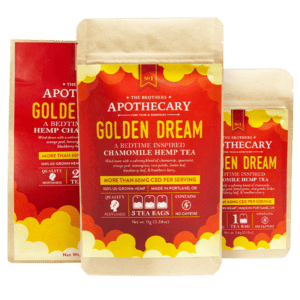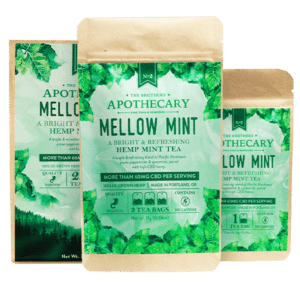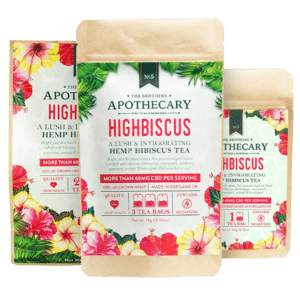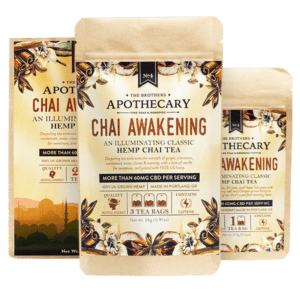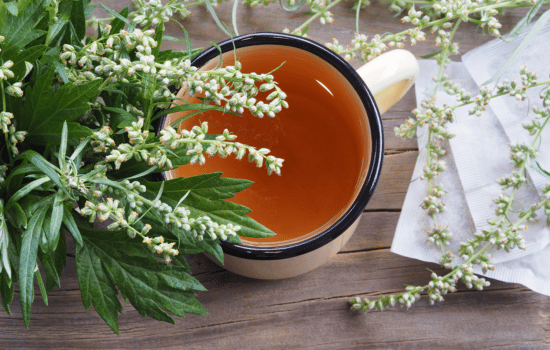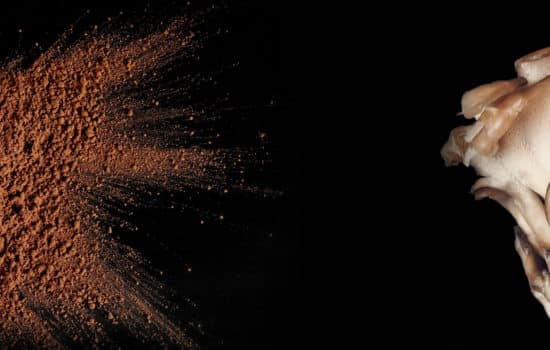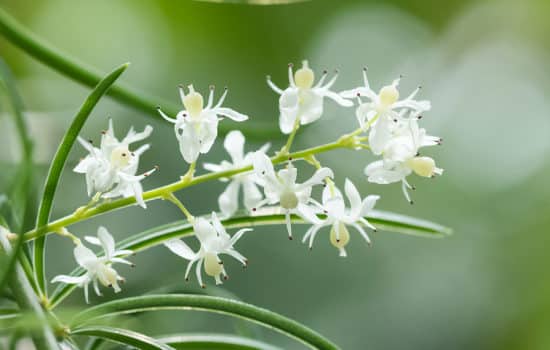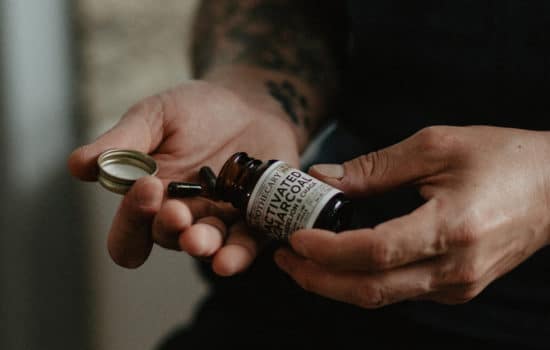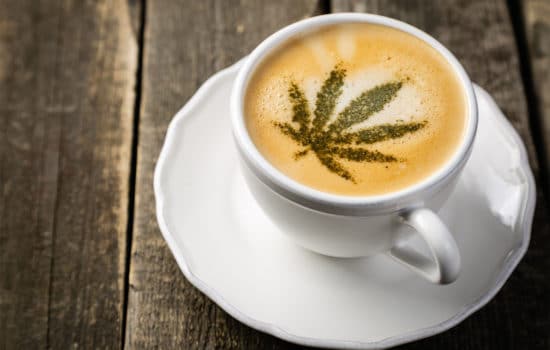Herbs are often used to encourage restfulness and relaxation. I mean, who doesn’t love a cup of calming herbal tea before bed? We can all use a little extra TLC these days, and here at The Brothers Apothecary, we are all for herbal remedies that help us hit the hay.
But, what about when we need a little extra push getting going throughout the day? What can you turn to when you are having trouble getting into the zone for that big and looming project at work or finding the motivation to power through just a few chores on your to-do list?
If you’re looking for a caffeine-free alternative to coffee that will help you focus without the risk of jitters, we have you covered with nine of our favorite herbs to help aid with concentration.
Which Herbs Can Aid With Concentration?
Ginkgo
Native to China, Japan, and Korea, the ginkgo biloba tree dates back to over 200 million years. The fan-shaped leaves of this ancient tree have been used to aid in concentration for much of human history.
One of the main compounds in ginkgo are terpenoids, which increase blood flow by opening blood vessels and reducing the stickiness of platelets—our smallest blood cells—which can keep them from clumping together.
Studies suggest that this increase in blood flow to the brain can help boost focus and memory, and help slow or prevent cognitive decline in older adults.
Lemon Balm
As a member of the mint family, the compounds in lemon balm can help promote alertness, especially in combination with other beneficial herbs.
Lemon balm is rich in phenolic compounds and antioxidants to support cognitive function. By helping reduce oxidative stress and increase the production of GABA neurotransmitters-–which can help soothe the nervous system–the compounds in lemon balm have been found to help both promote relaxation and increase alertness.
Peppermint
Another star member of the mint family, peppermint is well-loved for its cooling capabilities.
The bright and cooling fragrance of peppermint could play a role in cognitive function. Studies have found that when used in aromatherapy, peppermint may stimulate receptors in the hippocampus, which can ultimately help improve memory, alertness, and focus.
The menthol found within the peppermint leaves can also help relax the body and soothe tension throughout. By triggering gamma-aminobutyric acid (GABA) production within the brain, menthol can help reduce stress and calm the nerves, helping to shift focus to the task at hand.
Ashwagandha
Ashwagandha is a member of the nightshade family, and the root has been used in medicine for over ten thousand years.
This herb is often used to lower levels of the stress hormone cortisol. High levels of cortisol are released during times of stress, which can cause the body to pivot attention away from important body functions.
Evidence suggests that the phytocompounds in ashwagandha may work with the endocrine system to reduce cortisol levels. By reducing stress levels and helping the body refocus its energy, ashwagandha is thought to help enhance the mood and boost mental clarity.
Ginseng
Ginseng is a small plant found in Asia and America. The fleshy roots contain two plant compounds known as ginsenosides and gintonin. These two compounds can work synergistically to provide several benefits, including improved mental function.
Evidence suggests that the antioxidant properties of these compounds can help provide neuroprotective benefits, and one study found that ginseng boosted cognitive performance and lessened feelings of mental fatigue.
Sage
This popular herb is not only excellent for flavoring your meals but can also help aid in concentration.
Jam-packed with antioxidants, sage can help boost memory, improve reasoning and problem-solving, and promote alertness.
Saffron
Originally found in Greece, saffron has a long history of medicinal uses. As two of saffron’s main active ingredients, crocin and crocetin are believed to help improve memory and focus.
Turmeric
This warm, golden spice is a member of the ginger family that has been used for centuries. The main compound in turmeric is curcumin, and it can work within the endocrine system to provide several benefits.
Curcumin is thought to increase the production of brain-derived neurotrophic factor (BDNF) proteins found in the brain that support the growth and multiplying of neurons. BDNF proteins are known to help regulate memory, attention, and mood.
While stress has been linked to the reduction of BDNF, curcumin can help counter stress and improve focus as it restores BDNF levels.
Lion’s Mane
Here at the Apothecary, we have nothing but love for our fungi friends, and the lion’s mane is no exception.
This mushroom is large and shaggy, bearing a resemblance to a lion’s mane. With anti-swelling and antioxidant properties, the bioactive compounds hericenones and erinacines are also thought to increase BDNF production. By helping trigger the growth of brain cells through BDNF proteins, lion’s mane can help boost mood and focus.
How Often Should I Use Herbs for Concentration?
Most herbs can be used daily, although you should always check the instructions on your individual product.
How Much Should I Take?
When using herbal supplements, essential oils, or teas from a trusted and third-party tested source, you’ll want to stick to the daily recommended dosage labeled on the product.
Each herb has varying doses and potential side effects, so be sure to read the label and directions before use.
Precautions
Although herbs are natural, they can still contain strong active ingredients that can react with other medicines and herbal remedies, so make sure to check with your doctor if you are taking any other medicine or if you have an upcoming surgery before introducing herbal remedies to your routine.
Many herbal products are known to negatively react with blood thinners, blood pressure medication, and aspirin. You should also research possible interactions before combining herbal products.
Herbal products have not been thoroughly tested for children and should not be taken by anyone under 18 unless prescribed by a healthcare professional. You should also check with your doctor if you are over 65, as older adults may metabolize supplements differently.
You should also research the doses that have been tested for safety in clinical studies and follow the instructions on the label of trustworthy products. Do not exceed recommended dosage.
How Should I Use Herbs for Concentration?
Herbal Supplements
Herbal supplements are convenient ways to get an added boost of concentration any time of day. At The Brothers Apothecary, our capsules, like our Mental Clarity | CBD + Ginkgo Leaf, Shatavari, Rhodiola, & Ashwagandha, are tasteless and 100% vegetarian, with several herbs that can work together to benefit your brain and overall wellbeing.
Herbal Teas
Swap out your morning (or afternoon) coffee for a jitter-free herbal tea. Herbal teas are a soothing and delightful way to boost your energy sip by sip while also giving you the chance to engage in a little aromatherapy!
The Bottom Line
The beneficial plant compounds found in some of our favorite herbs can help improve focus whenever you need it. Whether it’s an upcoming test or a day of cleaning you can’t put off any longer, the right herbs are sure to help you get into the groove.
You can explore our full collection of herbal teas, supplements, and oils at The Brothers Apothecary shop!
Sources
Lemon balm Information | Mount Sinai
https://pubmed.ncbi.nlm.nih.gov/18041606/
Jesse Richardson is the co-founder of The Brothers Apothecary. He's an avid tea drinker and the primary creator behind The Brothers' products. An undergraduate of UCLA for Political Science, Jesse currently studies Medicinal Plants at Cornell University and The International School of Herbal Arts & Sciences.



